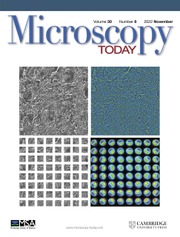No CrossRef data available.
Article contents
Using Fluorochromes To Label An Oil-ln-Water Emulsion
Published online by Cambridge University Press: 14 March 2018
Extract
A question was asked on the microscopy listserver about fluorescent probes for studying oil-in-water emulsions trapped in a cellulose membrane, I don't have experience with that exact problem (I have studied chloroform/water emulsions rather than emulsions of triglycerides or alkanes), but I can make some general suggestions. The best type of hydrophobic probe to use depends on whether the probe is to be added to the hydrophobic phase before emulsification or after. If it is to be added to the preexisting emulsion as a dimethylsulfoxide stock solution, a probe with some aqueous solubility is required.
- Type
- Research Article
- Information
- Copyright
- Copyright © Microscopy Society of America 2002


